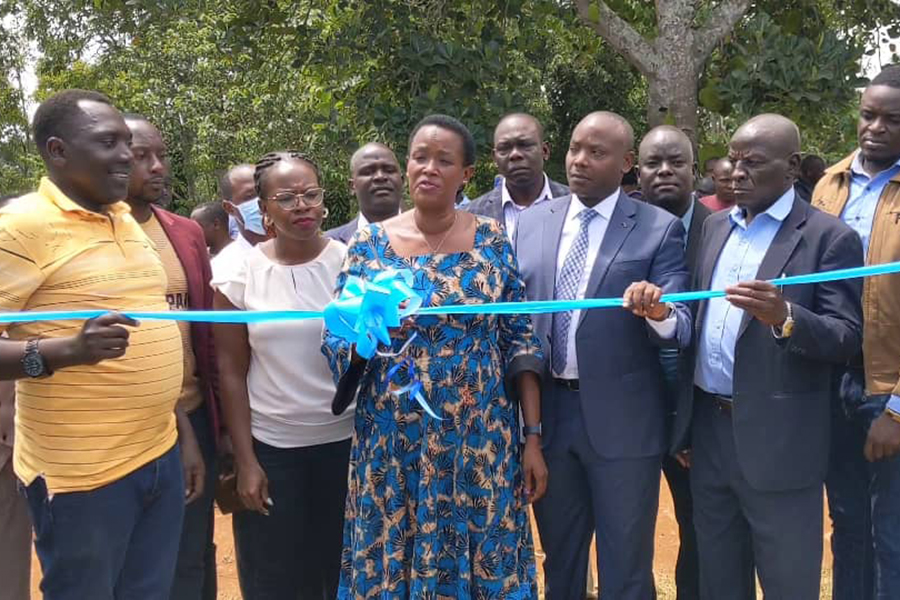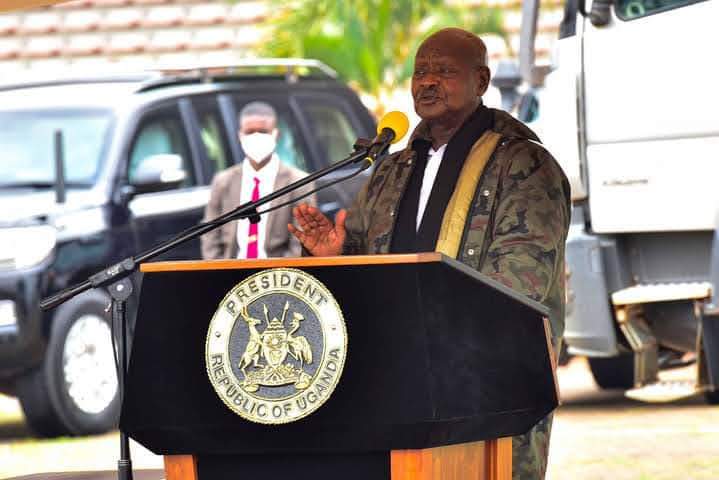
Minister Anite explains cancelling of Kilembe mines contract
The Minister of State for Investment, Evelyn Anite, announced that Uganda has ended its contract with Tibet-Hima, the concessionaire for Kilembe Mines, following demands from the Chinese investor to export 30,000 metric tons of gold, copper, and cobalt as samples for testing in China.Anite made these remarks last week while appearing before Parliament’s Committee on Natural Resources, where she was summoned to explain the slow progress in reviving Kilembe Mines in Kasese District.“This contractor demanded that the Government allow him to take 30,000 metric tons of copper, cobalt, and gold just for sampling. It was unreasonable for the contractor to think we would allow such a significant amount of our natural resources to leave the country,” Anite explained.She outlined three key reasons for the cancellation of the contract: the excessive quantity of products the investor sought for testing, claims that the mine was flooded, and a subsequent discovery of the investor’s incompetence to manage such an extensive operation.“The President stated that these resources belong to Ugandans. When Tibet-Hima learned that, they indicated they would not continue the contract, as noted in the winding-up commission’s report. We could not allow them to take 30,000 metric tons of our resources for sampling in China. It was unacceptable to the president, to me, and to government as a whole,” said Anite.Minister Anite expressed that she does not regret her decision to terminate the contract with Tibet-Hima and is prepared to face any consequences.“We made a mistake in the Government by contracting the wrong company. I am pleased to have taken responsibility and terminated the contract. I would gladly accept being fired for this decision because I did my job. I cannot accept a company lacking capacity to manage Government resources, particularly those comprising copper, gold, and cobalt. I stand proud of my actions and do not fear the repercussions,” Anite stated.Norah Bigirwa (Buliisa DWR) urged the Committee leadership to summon those responsible for awarding the contract to hold them accountable, questioning how such a significant contract could be granted without the investor possessing the necessary documentation.“I am disappointed not with Minister Anite but with the technical team at the Ministry of Finance. We need to understand who conducted the due diligence. If there had been no contract with Tibet-Hima, how could they have come into force?” Bigirwa asked.She added, “How can we continue to contract someone who lacks essential documents for such a substantial agreement? Where were the ministers, the technical teams, and the legal professionals during this process? Those responsible need to be held accountable.”In response, Minister Anite called for the summoning of former and current officials at the Ministry of Finance who oversaw negotiations with Tibet-Hima to explain why the contract was awarded to a company lacking capacity.“The Ugandans who were responsible for that office and who contracted Tibet-Hima need to be invited to this Committee to explain how they arrived at that decision. I wasn’t there, but they must clarify the parameters they followed. My responsibility is to explain why I terminated the contract,” she said.The Minister also noted that Tibet-Hima sought to alter the contract due to flooding in Kasese, a request that Uganda rejected. “While Tibet-Hima mentioned floods, they were not a daily occurrence. Thus, we could not agree with them on this matter,” Anite explained.She added that due diligence on Tibet-Hima revealed that the company lacked the necessary capacity, prompting her to initiate a winding-up commission that led to the contract’s termination.“The inability of the concessionaire to fulfill the contract led to job losses, forfeiture of concessionaire fees, and the missed opportunity to revive Kilembe Mines. I joined office in 2016, while my predecessor contracted Tibet-Hima in 2013. The President addressed this in his budget speech, indicating his intention to take action against corrupt ministers. I am uncertain if that was the consequence for them,” Anite stated.Anite’s assertion that Uganda lost 1 million jobs with the termination of the concession raised eyebrows, prompting Herbert Ariko, Chairperson of the Committee on Environment and Natural Resources, to question her calculations.“You claim we lost an opportunity for 1 million jobs due to this project. I would like to understand the basis for that figure because it is difficult to comprehend scientifically,” Ariko said.Anite stood by her figure, arguing that as an investor in hospitality, textiles, and manufacturing, her three businesses can generate 500 jobs. She emphasized that Kilembe Mines, due to its rich mineral deposits, could support a far greater number of jobs.“I can assure you that Kilembe Mines in colonial times provided 300,000 jobs, even before fully tapping its potential. With modern technology, we envisioned that the new concessionaire would conduct exploration, establish a refinery, and segment the processing of copper, cobalt, and gold. I maintain that the loss of 1 million jobs is significant for our country,” Anite concluded.Parliamentary ProbeThe Parliamentary inquiry was initiated following a petition by Solomon Silwany (Bukooli Central) in April 2024, which requested an investigation into the circumstances surrounding the termination of Tibet-Hima Mining Company’s contract to manage, rehabilitate, and operate Kilembe Mines for 25 years.According to Silwany, the Government failed to meet its obligations under the agreement, resulting in Tibet-Hima Mining Company incurring losses of $980 million (shs 3.581 trillion) between 2014 and 2017.Silwany told Parliament, “The petitioner paid shs4.2 billion to the government, directly employed 822 Ugandans, purchased equipment worth $22 million (shs 80.411 billion), and committed $183.5 million (shs676.187 billion) to future investments in resuming copper ore production from Kilembe Mines.”Tibet-Hima Ltd cited several grievances against the Ugandan Government, including the failure to hand over the Kilembe Mines site within nine months of the contract signing and government’s decision to reduce the concession period from 25 to 15 years, ultimately leading to contract termination despite Tibet-Hima’s preparations for mining activities, including upgrading operational facilities and de-watering underground mines.In his address to Parliament, Silwany requested an investigation into Tibet-Hima’s allegations and urged the Government to halt ongoing advertisements and subsequent procurement processes related to Kilembe Mines.By Parliament Watchhttps://www.ugbulletin.co.ug/minister-anite-explains-cancelling-of-kilembe-mines-contract/
News
Ugandan Citizen Abducted, Held in Secret Detention for Three Months, Sparks Outrage and Calls for Justice

A disturbing new case of unlawful detention has surfaced, highlighting the ongoing human rights crisis in Uganda. A Ugandan citizen was reportedly abducted and held in a secret facility, known as a “safe house,” for three months, only to be released without charge or explanation. This incident, reported by NTV Uganda, has sparked widespread condemnation and renewed calls for accountability regarding human rights abuses in the country.
While the details surrounding the abduction remain unclear, reports indicate that the individual was taken without due process and held incommunicado—an action that has long been condemned by human rights organizations. The victim’s release, with no charges filed and no clear justification, has angered activists and citizens, who view this as yet another case of egregious abuse of power by the state.
“This is a recurring pattern,” said one human rights activist. “Abductions, secret detentions, and unexplained releases have become all too common in Uganda. These acts violate fundamental human rights and erode public trust in the justice system.”
The use of “safe houses,” unregistered detention facilities reportedly operated by security forces, has been a focal point in numerous allegations of torture and illegal imprisonment. Despite repeated calls from both local and international organizations for their closure and accountability for those involved, little action has been taken to address these violations.
This case underscores the urgent need for reform within Uganda’s security apparatus and greater accountability for human rights abuses. Observers hope that drawing attention to these injustices will spur concrete action to bring those responsible to justice and ensure the protection of basic human rights.
As frustration mounts, calls for both domestic and international pressure to hold the government accountable for such crimes grow louder. “One day, there must be accountability for all these crimes against our people,” stated one social media user, reflecting the sentiments of many Ugandans.
News
NUP Gathering Disrupted: Kyagulanyi Alleges Security Force Harassment and Arrests

National Unity Platform (NUP) President Robert Kyagulanyi has accused Ugandan security forces of using excessive force to disrupt a planned NUP gathering. The allegations were detailed in a statement shared on Twitter, following an event held to honor children of NUP supporters who were killed, disappeared, or detained for their political beliefs.
According to Kyagulanyi, security personnel, under the command of an officer identified as Asiimwe, carried out a preemptive operation early in the morning upon learning of the NUP’s plans. The forces allegedly stormed the premises, arrested workers, and deployed tear gas to disperse those present.
“The criminals under the command of one Asiimwe deployed early morning, arrested our workers, and threw tear gas into our premises. They’ve cordoned off the premises and blocked all people from accessing the place,” Kyagulanyi wrote.
Among those reportedly arrested were Saava Peter, Mudenya Samson, and Turyasingura Samson. Kyagulanyi claimed the detained workers were subjected to beatings and interrogated about their political affiliations, with security operatives labeling them as terrorists.
“These JATT operatives asked the workers who they support politically, branding them terrorists and criminals—their only crime being that they work with us. You can imagine the indignity!” Kyagulanyi lamented.
This incident adds to the growing tension in Uganda’s political climate, where opposition parties frequently accuse the government of stifling dissent. Despite the challenges, Kyagulanyi ended his statement with a message of defiance and optimism, proclaiming, “UGANDA WILL BE FREE.”
NUP Gathering Disrupted: Kyagulanyi Alleges Security Force Harassment and Arrests
News
Sudan Demands Apology from Uganda Over Army Chief Muhoozi Kainerugaba’s Threat to Invade Khartoum

Sudan has demanded an official apology from Uganda over “offensive and dangerous” comments made by the chief of Uganda army staff, who threated to invade Khartoum, the Sudan Tribune has reported.
General Muhoozi Kainerugaba, son of Ugandan President Yoweri Museveni and CDF of the Ugandan army, posted two comments on the X platform on Tuesday in which he threatened “to capture Khartoum” with the support of the US President elect Donald Trump after he takes office. The posts were deleted later.
“The government of Sudan demands and official apology from the Ugandan government for the offensive and dangerous comments of the army commander,” Sudan’s foreign ministry said in a statement that the Sudan Tribune said it has seen.
Sudan Demands Apology from Uganda Over Army Chief Muhoozi Kainerugaba’s Threat to Invade Khartoum






